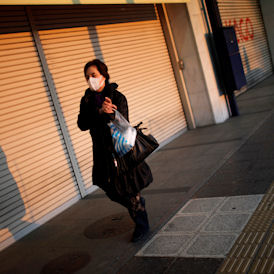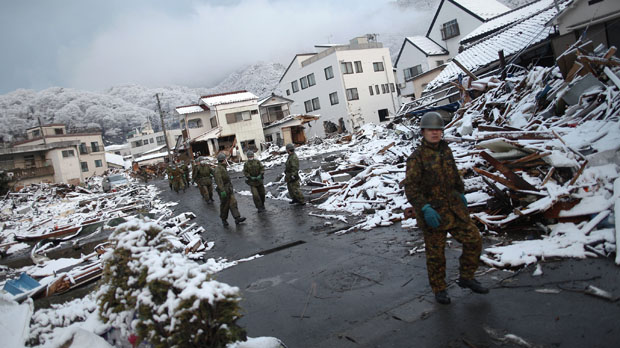Japan: life in the shadow of nuclear crisis
As Japan’s government rejects advice to widen the evacuation zone around the damaged Fukushima nuclear plant, a farmer in Iwate Prefecture tells Channel 4 News of life in the shadow of the crisis.

Both the UN nuclear watchdog and Japan‘s own nuclear agency have advised the Japanese authorities to widen the 20km evacuation zone around the stricken Fukushima plant.
The plant, damaged after the devastating earthquake and tsunami on 11 March, is still leaking radiation. Levels hit 4,000 times the legal limits in the nearby sea, and high levels have also been detected twice as far away as the evacuation zone edge.
The consequences of both seen and unseen disasters are daily life. Michael Sato, farmer in Japan
Japan’s Chief Cabinet Secretary Yukio Edano said the Government was reviewing the issue daily but “at this moment, no decision to expand the evacuation area has been made”.
More than 70,000 people have been evacuated from the evacuation zone, and a further 136,000 who live in a 10km band beyond that have been encouraged to leave or to stay indoors.
Radiation has also spread further afield, with higher than normal – but safe – levels detected as far away as the United States.
Read more in the Channel 4 News Special Report on Japan
Michael Sato is a farmer and a teacher in Hanamaki, Iwate Prefecture, north of Fukushima. He has lived in Japan for almost 11 years, and five years ago got eijusha or permanent resident status, and took his wife’s family name of Sato.
His life is far from back to normal as he struggles with the devastation caused by the earthquake, and the ongoing nuclear threat. He told Channel 4 News: “The consequences of both seen and unseen disasters are daily life.”
He wrote the paragraphs below about how he and his family and friends are coping.
Trust
I’m 47 and clearly remember drinking coffee in a cafe in London when the background radio music was interrupted with the stomach-lurching news about Chernobyl. When the news of the explosion at Fukushima broke, my instinctual reaction was to think “meltdown.”
I therefore followed as much of the news as I could.
All the way through, from the initial explosion to the acknowledgment of the meltdown, the message here has been time-related; that the given situation right now presents no immediate threat to health. As far as I’ve picked up from the domestic Japanese media there’s been little discussion about the long term health effects. I may well be wrong about that though.
Yesterday evening, the news reported that a farmer had committed suicide. My wife’s reaction was: ‘it begins’.
The question of trust is really interesting. I guess no one I know thinks the authorities are lying, but at the same time, no one I know thinks they’re telling the complete truth either. It’s all very odd. Back in England being “diplomatic with the truth” would be evidence of a cover-up. Here, there’s a general acknowledgment that it’s probably the only thing the Government can do to avoid widespread panic.
However, there seems to be no discussion on whether this is the right thing for the Government take. It’s just accepted that that’s how it is.

The ruins of Kamaishi, the hometown of one of Michael’s students
Fear
My family’s fear is as much about the Government deciding that when/if radiation levels increase in Iwate our vegetables will be unsellable (we check this website for updates), as it is with the long term heath consequences.
This is a rural, conservative community. Reputation is everything.
Lettuce is usually sold for around 140 – 190 yen. Two days ago in Hanamaki’s Itoyokado supermarket, there was large pile of lettuce going for just 100 yen each. That’s cheap. However, no one was buying them as they came from Ibaraki prefecture. I was surprised that they were being sold at all, but apparently these lettuces were harvested on a day when the radiation levels were said to be safe!
Renraku ga tsunkanai. I cannot contact. You hear this a lot now.
So, we’re entering a time when one day it’s safe to harvest/sell/eat leaf vegetables but another day it’s not? This is madness! How can anyone hope to run a farm based on that?
Yesterday evening, the news reported that a farmer had committed suicide. My wife’s reaction was: “it begins.”
‘I cannot contact’
It’ll be rice planting time soon. At the moment the fuel restrictions are still in full force. While the queues are shorter, I’m not sure how this will impact the farm. Tractors run on a light oil, and there’s still plenty of that. If the worst comes to the worst, it is possible to grow and harvest all the other vegetables we produce without the aid of any machinery (here’s a list made a few years ago), but it won’t be easy and no one’s getting any younger.
We opened our school again. The building has many new small cracks in the walls but is structurally sound. The damaged equipment can all be replaced. The first class taught following the disaster was a mixed level discussion class, the conversation naturally centring on the earthquake and its aftermath. Two of the three students’ family members are all safe and well. The other student’s hometown is Kamaishi (though she and her mother now live here in Hanamaki). She still hasn’t been able to contact any of her other relatives and friends.
Renraku ga tsukanai. I cannot contact. You hear this a lot now.
One student who lives in an area of Hanamaki that got most of the earthquake damage says she’s having to send bottled water to her relative in Tokyo because it’s all sold out there.
Not back to normal
We were prepared for Friday’s earthquake.
Sorry, this is going to sound really daft but following the Christchurch earthquake, Piers Corbyn at Weather Action issued an “increased chance of an earthquake” warning. I took the warning seriously and got stuff organized.
Friends email me asking if life is getting back to normal now….Mm.
The earthquake came on the Wednesday. It was 7.2. We got out of the old farm house, waited till it was subsided and then rechecked everything.
Then two days later, the big one came. Absolutely nothing could have prepared us for that of course. I was sure the house and barns were going to collapse. It was a truly dreadful experience. However, the freakish situation immediately following the quake was mitigated somewhat by the fact that we pretty much had all the things necessary to ride the power and water cut out in comparative comfort and safety.
We were so lucky. So lucky. I simply can’t emphasize that enough.
Friends email me asking if life is getting back to normal now?
Mm.
At the end of the day, it doesn’t matter who you are, where you are, what you are: life can suddenly change.